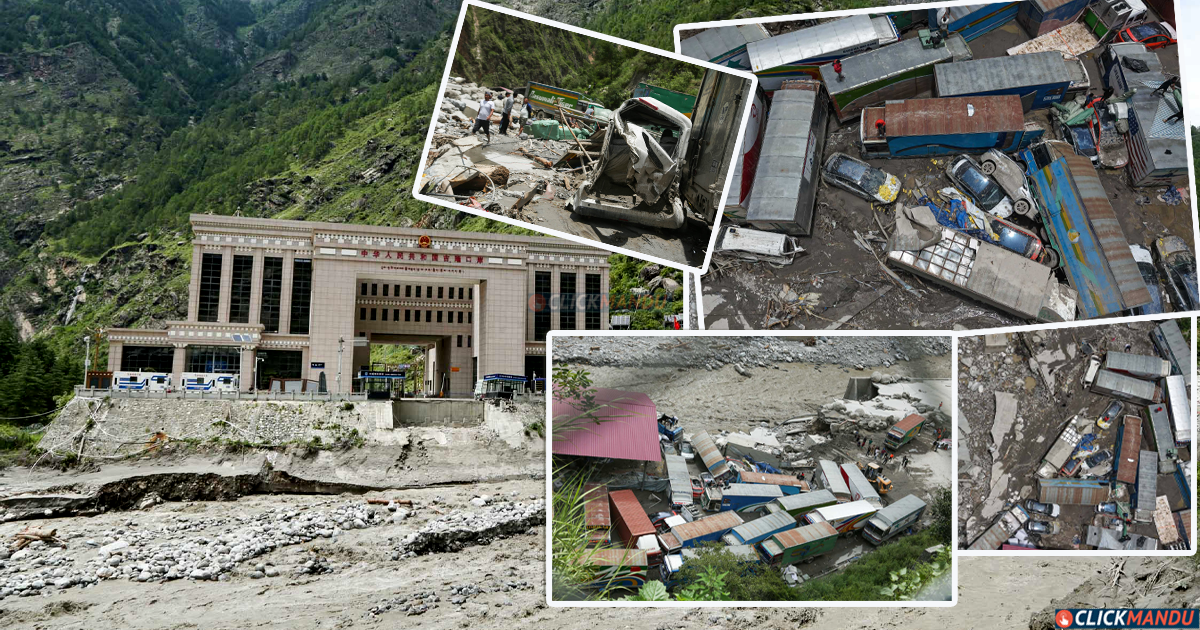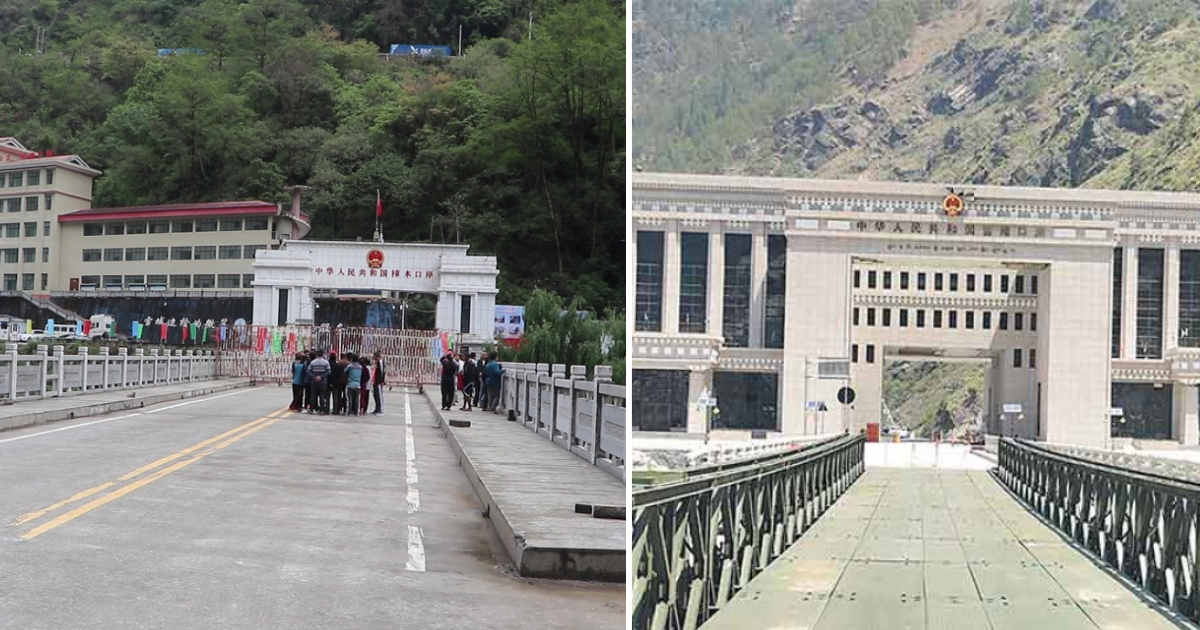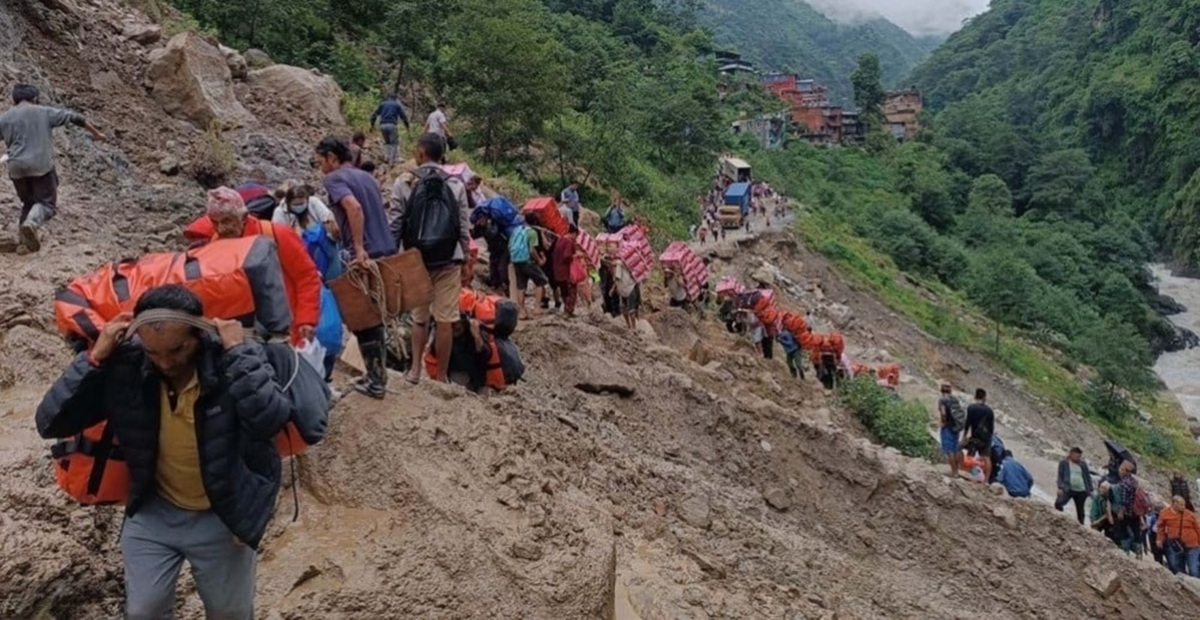Kathmandu: As Dashain approaches, Nepali traders have started bringing festival-targeted goods into Nepal via porters.
Until now, only fruits used to be transported this way, but since Sunday, traders say all types of goods for the Dashain market are now being carried by porters.
Due to floods and landslides, one of the two border points with northern neighbour China—Rasuwagadhi—has been completely cut off, while at the Tatopani crossing, a landslide about 100 metres long has blocked the road between the Larcha dry port and the Miteri Bridge. Containers have not moved from Larcha to Miteri Bridge for nearly two and a half months.
Traders say about 70 percent of goods consumed during Dashain and Tihar are imported from China. Despite difficulties caused by the Gen Z movement, as Nepal prepares to celebrate its biggest festival, traders have turned to porters as an alternative to move goods from China.
With the help of porters carrying bundles, traders are striving to keep the market across the country active and vibrant this festive season. Major markets like Asan, Mahabouddha, Khichapokhari, New Road, Indrachowk, Bhotahiti, and Jamal have already started seeing heavy crowds.
Although festive shopping has begun, the goods needed to keep markets fully supplied are still not arriving smoothly via containers. The Tatopani highway has been repeatedly blocked by landslides for around two and a half months.
According to Hemlal Kharal, president of the Nepal National Traders’ Federation, after the Rasuwagadhi border point completely shut down, traders rerouted some containers toward Tatopani.
But since the road to the Larcha dry port and Miteri Bridge remains blocked by landslides, traders have been unloading goods from Chinese containers and carrying them on porters’ backs to the dry port. From there, the bundles are checked and then loaded onto Nepali trucks and containers to be sent to Kathmandu and other destinations.
Every day, between 1,500 and 2,000 porters are engaged in transporting goods. For nearly three months, hundreds of containers carrying Dashain- and Tihar-related items have been stuck in various places in China due to floods and landslides.
Because of the Rasuwagadhi shutdown and repeated blockages on the Tatopani side, more than 500 containers loaded with festival goods have been stranded in Kerung, while around 1,600 containers have been stuck in Lhasa–Nyalam.
Traders say the containers hold goods worth over Rs 35 billion, including fruits, garlic, shoes, ready-made clothes, light jackets and jerseys, belts, watches, sports items, cosmetics, blankets, readymade mattresses, decorative lights for Tihar, and other electrical equipment.
“We cannot just leave the stranded containers. The goods were purchased with bank loans—if we abandon them, paying back loans and interest becomes impossible. So, even though the cost rises, we’ve begun bringing them in with porters,” Kharal said. “Initially we carried only fruits and perishable goods this way, but now we’re transporting everything.”
According to him, since Saturday, traders have been moving goods equal to 5 to 10 containers per day into Larcha via porters. Porters typically charge Rs 150 for a light bundle and up to Rs 500 for a heavy one. This adds about Rs 50,000 extra cost per container.
“But we will not pass this entire cost onto consumers,” Kharal said. “Because of the Gen Z movement, the market is already chaotic. In this situation, we traders will sell goods at prices that cover only our basic costs. We will not exploit the crisis by increasing the burden on consumers.”

Many containers have been rerouted from Kerung–Rasuwa to Tatopani, while some have even been diverted to Mustang’s Korala border.
Ram Hari Karki, president of the Nepal Himalayan Cross-Border Trade Association, said the government has failed to pay attention to repairing Tatopani roads and reopening Rasuwagadhi because of the political turmoil.
“Both border points are crucial for trade, but the government hasn’t taken them seriously. This Dashain festival has become a black day for traders like us. Dozens of containers are stranded on the other side, and even bringing them through porters isn’t easy,” Karki said.
For Nepali traders, the season of Dashain, Tihar, and Chhath is usually the most profitable period, when sluggish markets boom. Around 35 percent of Nepal’s annual economy—worth Rs 687 billion—circulates in the market during this time.
With the Tatopani border also blocked, the Larcha customs office has struggled to collect revenue.
According to Rajendra Prasad Chudal, chief of the Tatopani customs office, the border has been disrupted for the past two and a half months.
“When containers don’t arrive from China, revenue collection drops sharply. Some days we collect Rs 500,000, some days nothing at all,” Chudal said. “This border had a daily target of Rs 70 million. But because of the road blockages, collection has almost stopped.”
He added that recently, traders have begun carrying Dashain-targeted goods in bundles via porters to the dry port, where they are checked and then loaded into Nepali trucks and containers for distribution to Kathmandu and other cities. Some traders have also rerouted containers through Mustang’s Korala border.
According to Karki, on the Chinese side, temporary work is underway to reopen Rasuwagadhi by laying humepipes and gravel near the Miteri Bridge.
“But whenever it rains, floods wash away the temporary works,” Karki said. “Hopefully in about 20 days, we’ll be able to bring containers through Rasuwagadhi again.”
Traders have rerouted stranded containers from China to Mustang’s Korala border.
According to Kharal, more than 50 containers carrying Dashain and Tihar goods have now reached Korala. Each container cost an additional Rs 150,000–200,000 to reroute.
It takes at least five days for containers to travel from Kerung through Korala, then via Pokhara, to reach Kathmandu.
Ramesh Khadka, chief of the Korala border in Mustang, confirmed that nearly 100 Chinese containers have arrived there.
He said inspections have not been possible yet because of landslides and lack of internet in the area. Containers started arriving from Friday, and by Tuesday, 55 Chinese containers carrying clothing for Dashain had reached Korala. More are on the way now that the road has reopened.
Khadka said the containers were diverted to Korala after Rasuwagadhi and Tatopani shut down. At an altitude of 4,700 meters, Korala border now operates with new infrastructure, internet, and electricity. Already, 151 electric vehicles have been imported from China via Korala, while Nepal has exported statues, textiles, and bamboo stools.
Rasuwagadhi has been closed since floods and landslides on July 8. At Tatopani too, road repairs have been delayed, leaving goods stuck for 46 days.
The operation of Korala has offered relief to traders struggling to find festival raw materials and goods.
With Korala now open for trade, new opportunities are emerging in Gandaki and Lumbini provinces, businessmen say. Traders have begun importing goods via Mustang–Myagdi–Kathmandu. Korala had previously been limited to local use in Upper Mustang since November 2023, but now it is officially open for trade.
According to Subin Shrestha, president of the Myagdi Chamber of Commerce and Industry, Korala and the Kaligandaki Corridor have created new opportunities for Dhaulagiri region trade.
Around 300 containers have already reached Korala, and another 1,500 are expected to arrive soon for Dashain.
“Traders from Mustang, Myagdi, Baglung, Parbat, and Kaski are excited. Bringing goods via Korala is cheaper for Gandaki and Lumbini,” Shrestha said.
Nepal Rastra Bank has authorized opening Letters of Credit (LCs) for imports via Mustang’s Korala customs.
On Tuesday, the central bank amended its unified circular for foreign exchange institutions to include Mustang. Previously, LCs could only be opened for imports via Tatopani or Rasuwagadhi.
Even though Tatopani and Rasuwagadhi remain blocked, the Ministry of Industry, Commerce and Supplies had already notified that imports through Mustang’s Korala customs would be permitted. Following this, the central bank officially allowed banks to open LCs for Korala imports.

The bank also said traders may now make payments via drafts and telegraphic transfers (TT) for imports through Korala, up to the existing limits. This facility was previously available only for Tatopani.



Comment Here